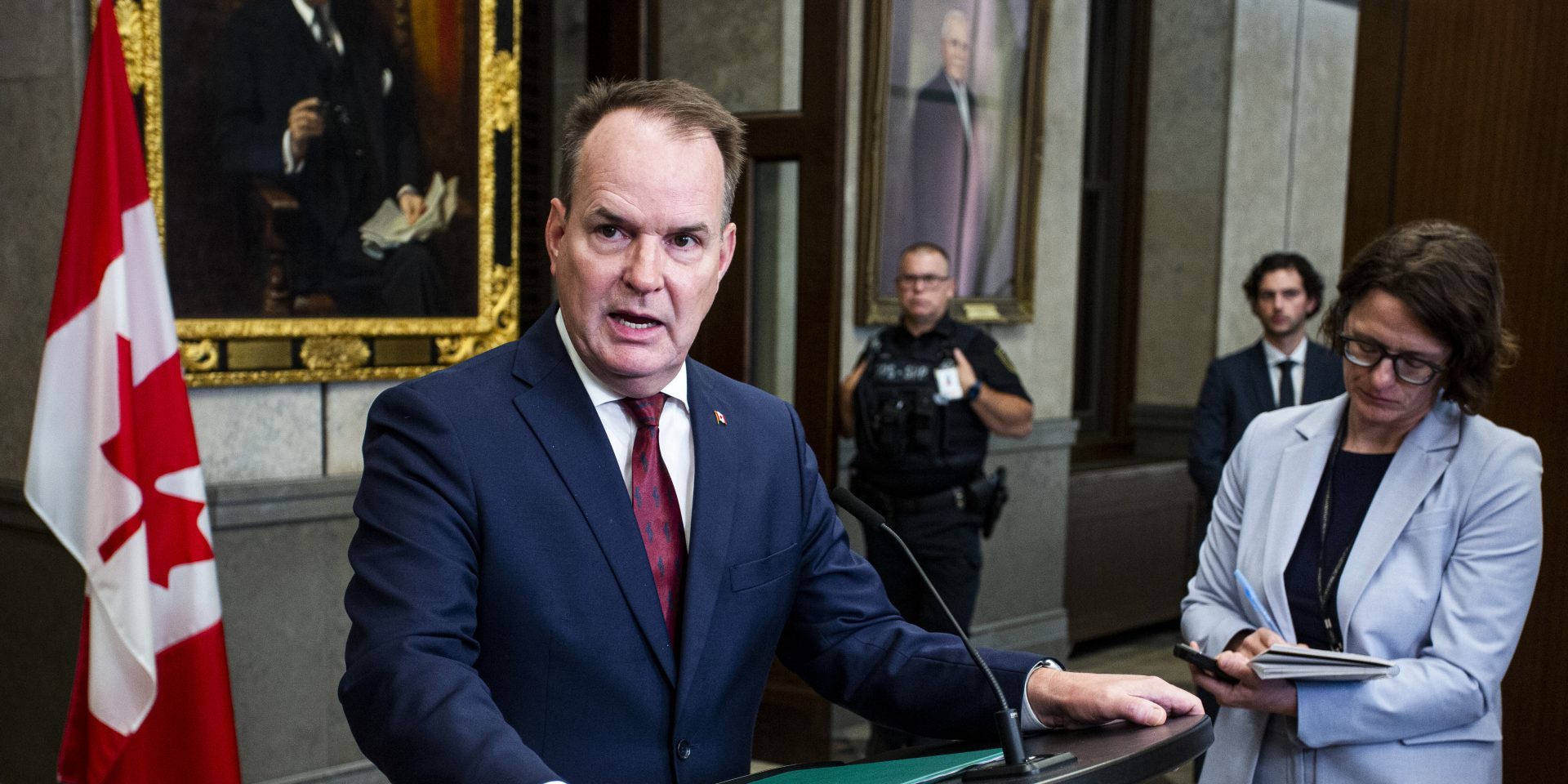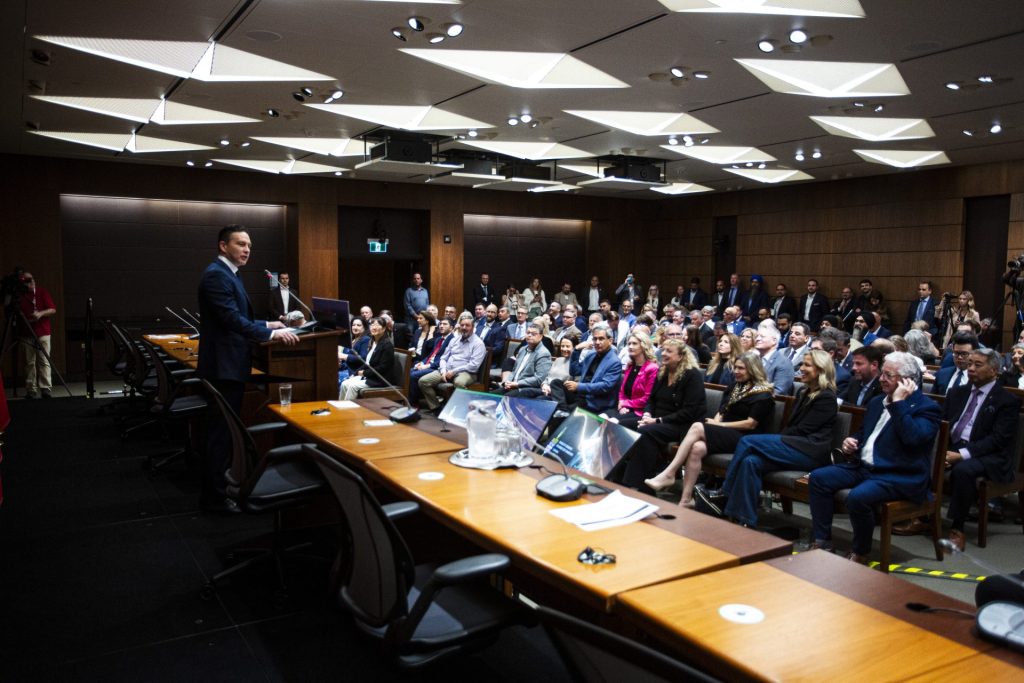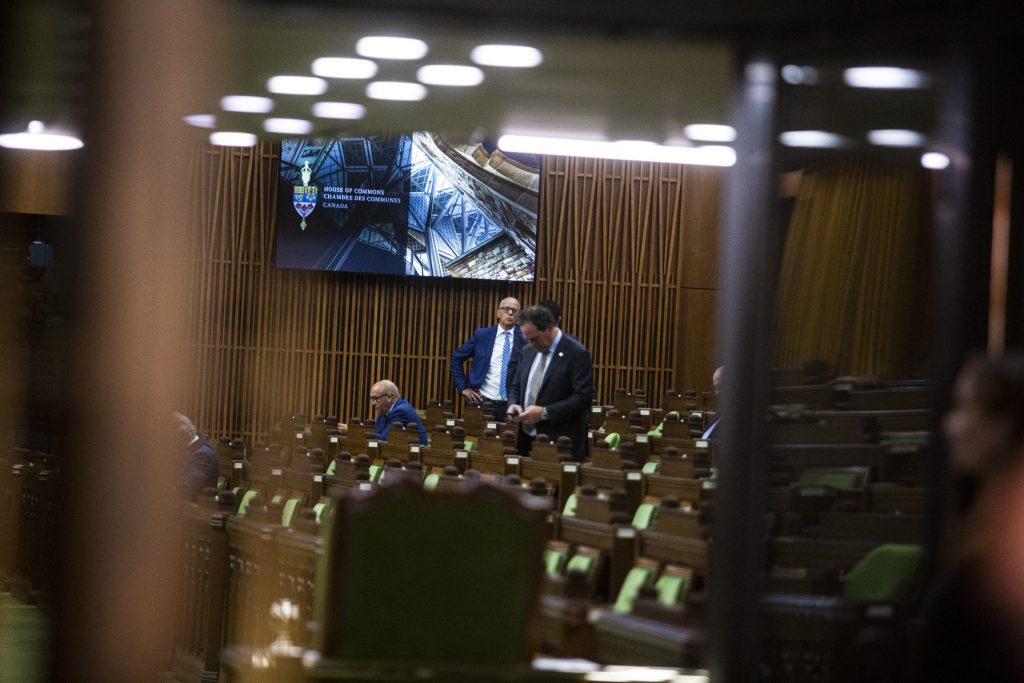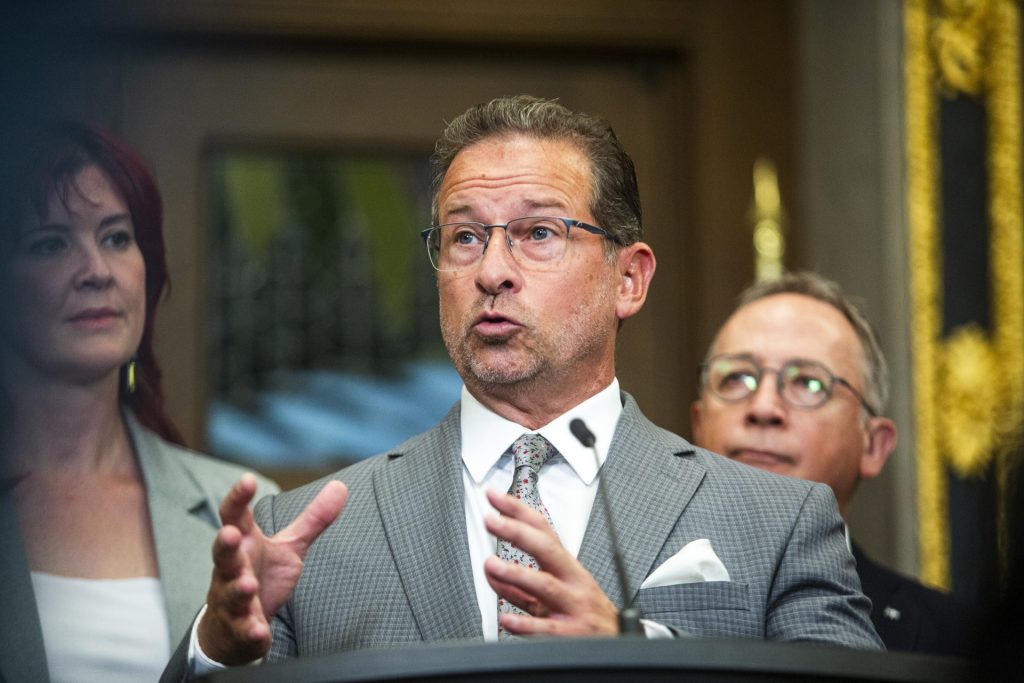Government House Leader MacKinnon calls for co-operation, but criticizes Poilievre’s ‘angry rhetoric’ as House resumes

Government House Leader Steven MacKinnon kicked off a new sitting of Parliament with a plea for co-operation from the newly re-minted leader of the opposition, as the Liberals sit in a precarious minority position with a busy legislative agenda and a pending fall budget.
“We are in a minority Parliament and we will be looking to all parties and all MPs for collaboration,” MacKinnon (Gatineau, Que.) told reporters on Sept. 15, but opted for some early attacks ahead of Conservative Leader Pierre Poilievre’s (Battle River-Crowfoot, Alta.) return to the floor of the House of Commons.
“There’s a lot of work to do this fall, and this place works best when we work together.”
He said Poilievre—who lost his Ottawa-area seat in the spring election only to regain a new one in an ironclad Conservative riding in rural Alberta—has in the past taken an approach that was “far from responsible.” MacKinnon blamed Poilievre for shutting down Parliament for the last few months of then-prime minister Justin Trudeau’s tenure.
He criticized Poilievre’s approach of “three-word slogans and angry rhetoric,” and while “the lyrics might have changed, the music stays the same.”
MacKinnon said he’s appealing to Conservative voters and some MPs to support the Liberals, saying some will be willing to “pitch in and build this country,” to strengthen the economy and to combat crime.
“These are things we will be proposing that we will work together on,” he said, adding Canadians are seeking a more co-operative parliamentary approach where parties work together.
Poilievre and Prime Minister Mark Carney (Nepean, Ont.) addressed each other during Question Period for the first time on Monday. The two traded a cordial handshake on the floor of the Green Chamber before the afternoon’s questions began.
Poilievre thanked Carney for swiftly calling a by-election in Battle River-Crowfoot, the second-safest Conservative seat in the country, enabling the Conservative leader to swiftly punch his ticket back into the House of Commons.
“I wonder if one day he might regret the decision,” Poilievre said in his opening remarks.
“In the spirit of good faith, I wonder if he agrees that our goal should be a Canada where hard work is rewarded, food and homes are affordable, streets are safe, borders are solid, and we’re all united under a proud flag.”

The two traded good-natured quips about crime, government spending, and the deficit.
Carney said “a few things had changed” since Poilievre was last in the House, including the election of the largest womens’ caucus in Canadian history.
“It’s true,” Poilievre replied, “when I left there was a Liberal PM making excuses about breaking promises, running massive deficits, cost, crime, and chaos were out of control … whereas today, we have a Liberal PM breaking promises, making excuses, running massive deficits with costs, crime, and chaos out of control.”
This fall’s legislative agenda includes debate on bills that were introduced before the summer break, including Bill C-2, or the Strong Borders Act, which tightens immigration rules, limits who can pursue refugee claims, and expands the type of information that police can demand from “service providers” without a warrant. Additionally, Bill C-4, the Making Life More Affordable for Canadians Act, includes an income tax reduction and eliminates the GST for new homes under $1-million, while also officially scraping the consumer carbon tax. It also exempts political parties from federal and provincial privacy laws.
The Carney government passed Bill C-5, the One Canadian Economy Act, with the help of the Conservatives ahead of the summer recess, in an effort to remove interprovincial trade barriers in light of the trade war with the United States.
“We are a minority government, yes, but we believe that we have a mandate to proceed with major policies,” MacKinnon said.
He indicated legislation is forthcoming with a focus on immigration and crime, two tent poles of the Conservative agenda.
“I think you can expect to see from the government a significant initiative, with respect to crime, all sorts of crimes in this country, hate crimes, violent criminals,” MacKinnon said, which will include “a pretty comprehensive approach to making our community safer.”

Green Party Leader Elizabeth May (Saanich—Gulf Islands, B.C.) criticized Bill C-2 as “a reduction in civil liberties” that requires further scrutiny. She pledged to do “everything possible” to either amend the legislation, or “preferably” to convince Carney to withdraw it altogether, she told reporters.
May said Bill C-5 was speedily passed without proper study, something she called an abuse of the parliamentary process.
“For all of the pieces of legislation that we’ll be seeing this fall, I hope we never again see anything like the programming motion used to bulldoze through bills,” she said, adding that C-5 passed with Conservative support and objections from the Greens and NDP.
The Carney government has been criticized this past summer for seeming to abandon its climate commitments, as a part of the party’s post-election rightward shift.
May also said the government has been retreating from its climate commitments—which she characterized as “dangerous and irresponsible”—by repealing the consumer carbon tax and pausing the electric vehicle mandate. She said she planned to press the government on its climate change plan now that “key elements” had been removed.

“I hate to see public policy driven by algorithms and rage farming on social media,” she said, characterizing the carbon tax as “the one thing that any government has ever done to get the needle going in the right direction,” in lowering fossil fuel emissions.
“I don’t think Mr. Carney is afraid of doing difficult things, so I look forward to hearing from him how he thinks you can suck and blow at the same time,” May said.
She noted Carney wrote in his 2021 book, Value(s), that “the more one delays meeting climate targets, the harder it gets.”
She said she’s ready to give Carney the benefit of the doubt, but added “any Green who places their faith in the leader of the Liberal Party, regardless of his name, is an idiot.”
But, she said, “I will not conclude prematurely that he’s on the wrong side of his children’s future. … I’d like to see some evidence that he remembers what he wrote in the book, otherwise I’m prepared to pony up and buy another one, at retail price to give it to him, so he might re-read it.”
As for the Liberals’ apparent rightward shift, May noted the party is three seats short of a majority. Instead of finding those votes from the progressive NDP and Greens, they “didn’t need to look on the left,” she said.
“Because they’ve moved so far to the right that they got all the votes they needed from the Conservatives.”
In his first press conference back on the Hill, Bloc Québécois Leader Yves-François Blanchet (Beloeil-Chambly, Que.) criticized the Liberals’ controversial Bill C-5, which passed the House and Senate with limited debate just ahead of Parliament’s summer recess.
Blanchet said that though the Bloc isn’t opposed to infrastructure development, the party is against the feds challenging provincial jurisdictions, particularly Quebec’s.
The Major Projects Office launched on Aug. 29, and the first round of projects for consideration were released on Sept. 11.
When asked about the soon-to-be-tabled fall budget, Blanchet said it was “too far” from the fiscal blueprint for him to signal his party’s support or not. The Liberals will need the support of at least one other party to pass their first budget since April 2024.
Before the April election, Blanchet had signalled he would work in collaboration with the government to tackle threats from the U.S. But he’s been less committal since.
When asked if his party would collaborate with the Liberals to tackle the ongoing trade war—or with the Conservatives to topple the minority government—the leader said simply, “I will collaborate with anyone who favours Quebec’s interests.”

While Sept. 15 marked the first official day of a new sitting in the House of Commons, leaders got the jump on business, with both Carney and Poilievre making public appearances the day before.
Poilievre hinted the Tories may not continue with the post-election friendliness that characterized the spring session, citing disappointment in the way Carney has handled Trump and the trade war.
“He promised elbows up, and where did the elbows go?” Poilievre said. “The American tariffs on Canada have doubled since the prime minister took office promising that he could ‘handle Trump,’ that’s not what Canadians voted for.”

Earlier in the day, Carney unveiled the Build Canada Homes agency, a cornerstone of the Liberals’ plan to build affordable housing. The government has pledged to spend $13-billion for the agency to build 4,000 “factory-built” homes on six federally owned government properties in the Ontario cities of Ottawa and Toronto, as well as Winnipeg, Man.; Edmonton, Alta.; Longueuil, Que.; and Dartmouth, N.S.
Poilievre panned the agency as “another bureaucracy that will only slow things down.”
Speaking to his caucus on Sept. 14, Poilievre said the party would “oppose things we’re against, and support things we’re for.”
But, he added, “we will also propose solutions to the problems Liberals have created.”
Editor’s note: This story was updated at 4:22 p.m. on Sept. 15 to reflect comments made during Question Period.
mglass@hilltimes.com
The Hill Times






 LICENSING
LICENSING PODCAST
PODCAST ALERTS
ALERTS













